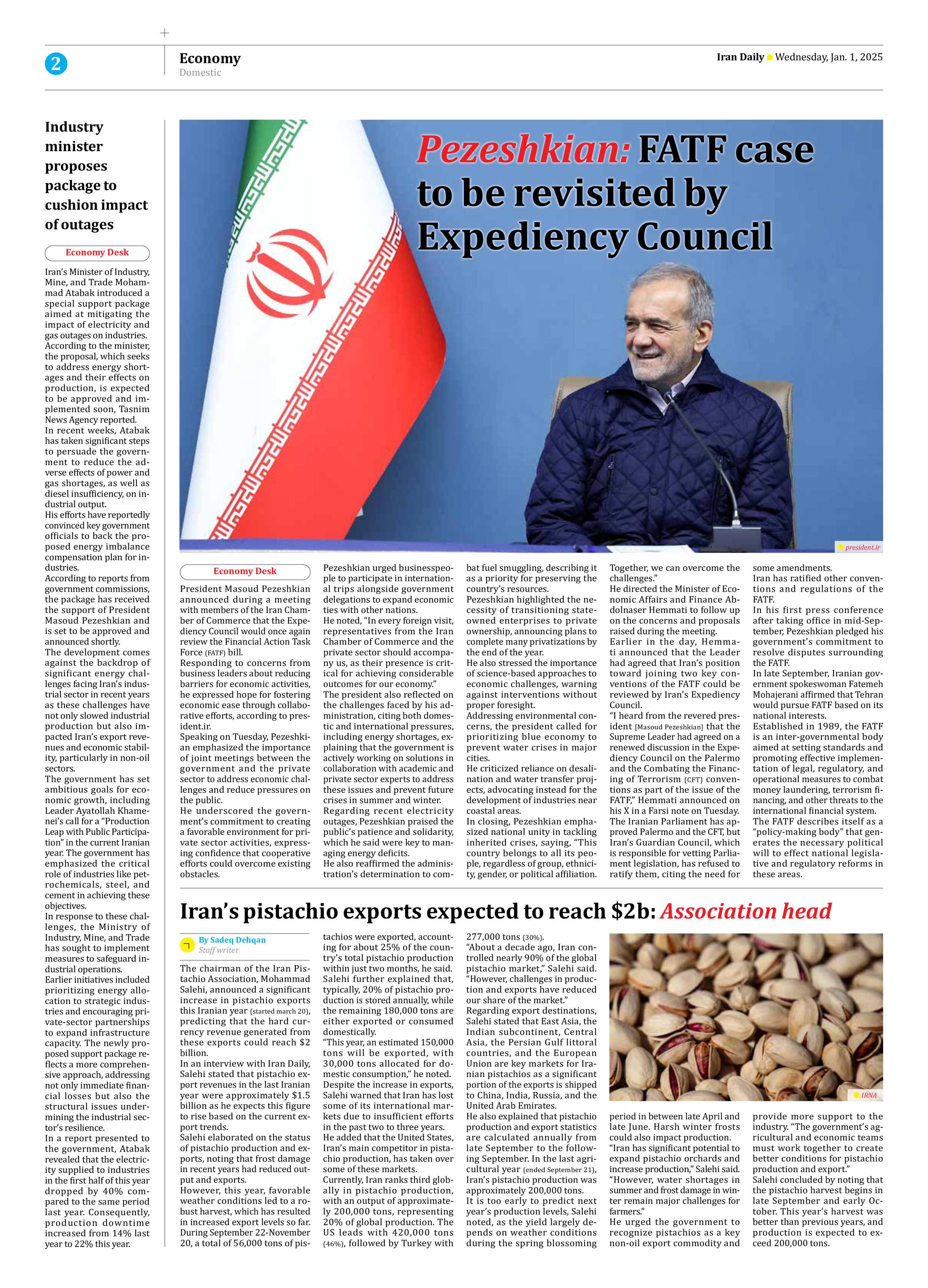
Pezeshkian: FATF case to be revisited by Expediency Council
President Masoud Pezeshkian announced during a meeting with members of the Iran Chamber of Commerce that the Expediency Council would once again review the Financial Action Task Force (FATF) bill.
Responding to concerns from business leaders about reducing barriers for economic activities, he expressed hope for fostering economic ease through collaborative efforts, according to president.ir.
Speaking on Tuesday, Pezeshkian emphasized the importance of joint meetings between the government and the private sector to address economic challenges and reduce pressures on the public.
He underscored the government’s commitment to creating a favorable environment for private sector activities, expressing confidence that cooperative efforts could overcome existing obstacles.
Pezeshkian urged businesspeople to participate in international trips alongside government delegations to expand economic ties with other nations.
He noted, “In every foreign visit, representatives from the Iran Chamber of Commerce and the private sector should accompany us, as their presence is critical for achieving considerable outcomes for our economy.”
The president also reflected on the challenges faced by his administration, citing both domestic and international pressures, including energy shortages, explaining that the government is actively working on solutions in collaboration with academic and private sector experts to address these issues and prevent future crises in summer and winter.
Regarding recent electricity outages, Pezeshkian praised the public’s patience and solidarity, which he said were key to managing energy deficits.
He also reaffirmed the administration’s determination to combat fuel smuggling, describing it as a priority for preserving the country’s resources.
Pezeshkian highlighted the necessity of transitioning state-owned enterprises to private ownership, announcing plans to complete many privatizations by the end of the year.
He also stressed the importance of science-based approaches to economic challenges, warning against interventions without proper foresight.
Addressing environmental concerns, the president called for prioritizing blue economy to prevent water crises in major cities.
He criticized reliance on desalination and water transfer projects, advocating instead for the development of industries near coastal areas.
In closing, Pezeshkian emphasized national unity in tackling inherited crises, saying, “This country belongs to all its people, regardless of group, ethnicity, gender, or political affiliation. Together, we can overcome the challenges.”
He directed the Minister of Economic Affairs and Finance Abdolnaser Hemmati to follow up on the concerns and proposals raised during the meeting.
Earlier in the day, Hemmati announced that the Leader had agreed that Iran’s position toward joining two key conventions of the FATF could be reviewed by Iran’s Expediency Council.
“I heard from the revered president [Masoud Pezeshkian] that the Supreme Leader had agreed on a renewed discussion in the Expediency Council on the Palermo and the Combating the Financing of Terrorism (CFT) conventions as part of the issue of the FATF,” Hemmati announced on his X in a Farsi note on Tuesday.
The Iranian Parliament has approved Palermo and the CFT, but Iran’s Guardian Council, which is responsible for vetting Parliament legislation, has refused to ratify them, citing the need for some amendments.
Iran has ratified other conventions and regulations of the FATF.
In his first press conference after taking office in mid-September, Pezeshkian pledged his government’s commitment to resolve disputes surrounding the FATF.
In late September, Iranian government spokeswoman Fatemeh Mohajerani affirmed that Tehran would pursue FATF based on its national interests.
Established in 1989, the FATF is an inter-governmental body aimed at setting standards and promoting effective implementation of legal, regulatory, and operational measures to combat money laundering, terrorism financing, and other threats to the international financial system.
The FATF describes itself as a “policy-making body” that generates the necessary political will to effect national legislative and regulatory reforms in these areas.







